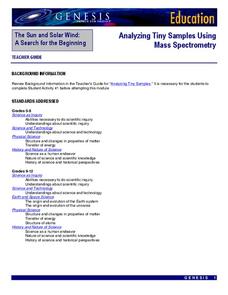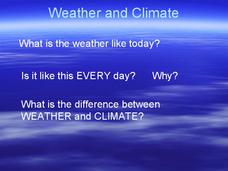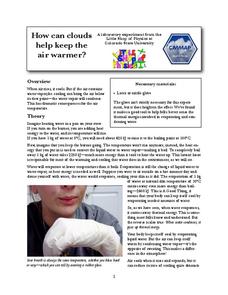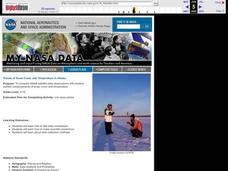Discovery Education
Motion in the Ocean
How do temperature changes affect ocean currents? Scholars explore convection currents by demonstrating the flow of water in a baking dish. They use ice, heat, and food coloring to see currents. Then, they draw conclusions about their...
Columbus City Schools
Photosynthesis and Respiration
Thirty percent of the world's oxygen is produced by rainforests found throughout the world. Seventh grade learners explore the processes of photosynthesis and respiration through 10 days of labs, manipulatives, and discussions. They...
NASA
Analyzing Tiny Samples Using a Search for the Beginning Mass Spectrometry
Teach the basics of mass spectrometry with a hands-on lesson. The fourth in a series of six lessons explores how mass spectrometry measures the ionic composition of an element. Learners then compare and contrast relative abundance and...
Curated OER
Weather and Climate
It's hot today, but is that the weather or the climate? This colorful presentation isolates both concepts to allow for better understanding by covering the positioning of the planet, making comparisons of land versus water, and looking...
Colorado State University
How Can Clouds Keep the Air Warmer?
Condensing water warms the air around it. Young scholars consider this concept as they experiment with air temperature around evaporating and condensing water vapor. They simulate the formation of clouds to experience the associated...
PHET
Features of the Sun
There are so many things to discover about the sun! Pupils discuss their knowledge of the sun, explore its features, apply their knowledge by labeling photographs, and then reflect on their learning by working in groups to draw and label...
Curated OER
Pollination Station
Pupils investigate why and how bees pollinate flowers and other plants. They define pollination, and read and sing along with the song "Yo, i'm a Flower." Students examine a diagram of a flower, simulate bees pollinating flowers, and...
Curated OER
What Are Waves?
In this types of waves worksheet, students will read 9 types of waves and classify them as either mechanical, electromagnetic, transverse, or compressional waves. Then students will label two wave diagrams with the 8 kinds of waves...
Curated OER
Ionic Bonding
In this ionic bonding worksheet, students observe diagrams about ionic bonds and crystal formation. They answer 37 short answer questions about the properties of monatomic ions, polytomic ions and write correct formulas.
Curated OER
Ionic Compounds
In this ionic compounds learning exercise, students identify the number of electrons gained or lost in ions, they show that transfer of electrons in ionic compounds and they write balanced ionic compounds given ions. They answer 4...
Curated OER
Physics: Electricity and Magnetism
Young scholars draw series and parallel electrical circuits. In this electromagnet lesson, students describe how current changes depend on circuit components. Young scholars use an OHT of a series and parallel circuit to predict the path...
Curated OER
Science: Hurricanes As Heat Engines
Students conduct Internet research to track the path of Hurricane Rita. They record the sea surface temperature of the Gulf of Mexico during and after the hurricane and draw conclusions about how hurricanes extract heat energy from the...
Curated OER
Carbon and Oxygen Cycles
Students construct their own diagrams outlining the pathway of carbon and oxygen in the atmosphere. Students explain their diagrams outlining the pathway and teacher checks for accuracy and completion.
Curated OER
Plate Tectonics Day 4 Earth's Interior Structure and Convection Currents
Students introduced to the interior structure of the Earth. They explore how the Earth's interior is broken down according to both it's physical properties and it's chemical composition. Students explore how convection currents within...
Curated OER
Trends of Snow Cover and Temperature in Alaska
Students gather historical snow cover and temperature data from the MY NASA DATA Web site. They compare this data to data gathered using ground measurements from the ALISON Web site for Shageluk Lake. They graph both sets of data and...
Virginia Department of Education
Hurricanes: An Environmental Concern
Hurricanes, typhoons, and tropical cyclones are the same type of storm, but their names change based on where they happen. Scholars use a computer simulation to learn about hurricanes. Then they hypothesize ideas to prevent hurricanes...
Curated OER
One Path
Students discover that charge movement through a circuit depends on the resistance and arrangement of the circuit components. In a hands-on activity, students build and investigate the characteristics of series circuits. In another...
Curated OER
Hurricane Frequency and Intensity
Students examine hurricanes. In this web-based meteorology lesson, students study the relationship between ocean temperature and hurricane intensity. They differentiate between intensity and frequency of hurricanes.
Curated OER
You Can Die Here
Students examine Death Valley including the amount of precipitation and winds that it gets. In this climate based lesson students explain the reasons for the amount of precipitation and windward patterns in Death Valley.
Curated OER
Volcanic Activity in the U.S.
Students locate and map ten volcanoes in United States, create chart comparing volcanoes by last eruption, type of volcano, location, and interesting fact, and create Powerpoint slide show describing basic
information about volcanoes and...
Curated OER
Oscillations
Students construct and compare the actions of various pendulums. In this pendulum motion instructional activity, students build and test different types of pendulums. They conduct experiments with the length of the swing arm and apply...
Curated OER
Force and Motion
Each of the slides here gives a definition, equation, or calculation example for a component of force and motion. This large collection covers topics from momentum and Newton's laws to centripetal forces and simple machines. Animations...
Curated OER
What's For Dinner?
Students explore the food chain. They brainstorm and create a consumer-consumed food chains using magazine pictures and research materials. Students identify consumer-consumed relationships.
Curated OER
Two Way Causality in Ecosystems
Young scholars complete various activities in order to explain that ecosystems are complex and that animal behavior (mainly that of a predator) is not necessarily intentional or bad.

























